AL GAS NATURAL LICUADO (AÚN) LE ENCANTA EL LAVADO VERDE
15.10.2025
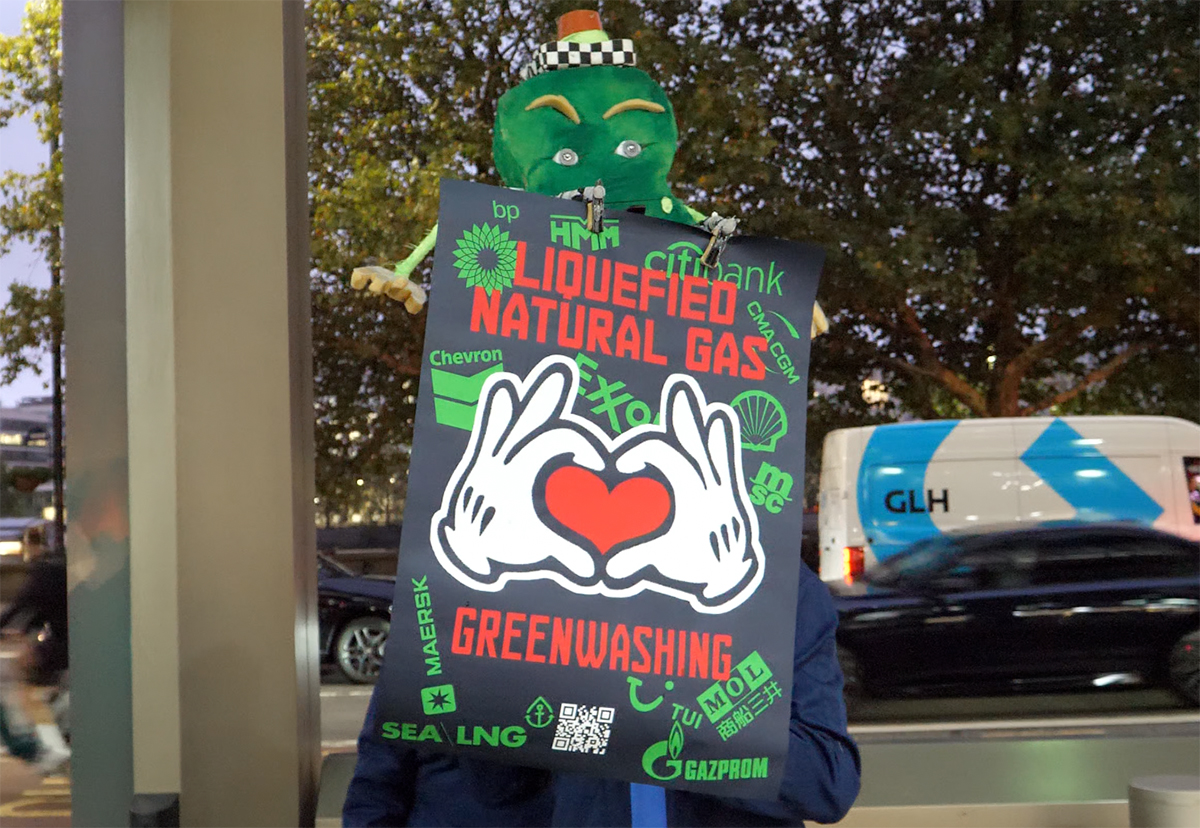
⬆️ Scrubby se prepara para pegar carteles en las ventanas de la OMI de la ONU.
-
Esta semana se reúne el segundo periodo extraordinario de sesiones de la Organización Marítima Internacional (OMI). En ella, los delegados de la OMI y los Estados miembros ultimarán planes para regular la contaminación marítima.
Con motivo de esta ocasión especial, hemos pensado recordarles que no todas las emisiones de los buques reciben el mismo trato. De hecho, es posible que algunas no se tengan en cuenta en absoluto. La semana pasada Shell anunció planes para extraer más gas natural licuado - el combustible que la industria del petróleo, el gas y el transporte marítimo está presionando para que quede exento de la normativa de la OMI sobre contaminación marítima.
⬆️ ¡La redecoración de ventanas ya está en marcha!
-

⬆️ ¿Por qué hay carteles en la ventana? Para recordar a los Estados miembros y delegados de la OMI que todos los combustibles fósiles deben recibir el mismo trato. Al fin y al cabo, el "gas natural licuado" (❤️ Greenwashing) sólo escapa a las normas de contaminación previstas para el transporte marítimo.
-

⬆️ Aquí viene Scrubby con otro cartel.
-
El destino del Océano depende de todos nosotros.
Nuestras intervenciones dependen de su apoyo.
A las 18.00 horas, mientras los delegados degustaban canapés y bebían vino, apareció en la ventana de su recepción un "Scrubby, la esponja del lavado verde", sosteniendo un cartel. Un cartel que contenía el mensaje gráfico "AL GAS NATURAL LICUADO LE ENCANTA EL LAVADO VERDE". El precario Scrubby, montado en una larga pértiga de 4 metros, pegó el cartel en la ventana, dando a todos los que estaban dentro la oportunidad de aplaudir sus maravillosas habilidades. A continuación, se balanceó hasta el suelo para recoger otro cartel y repetir el proceso hasta cubrir todas las ventanas de la OMI.
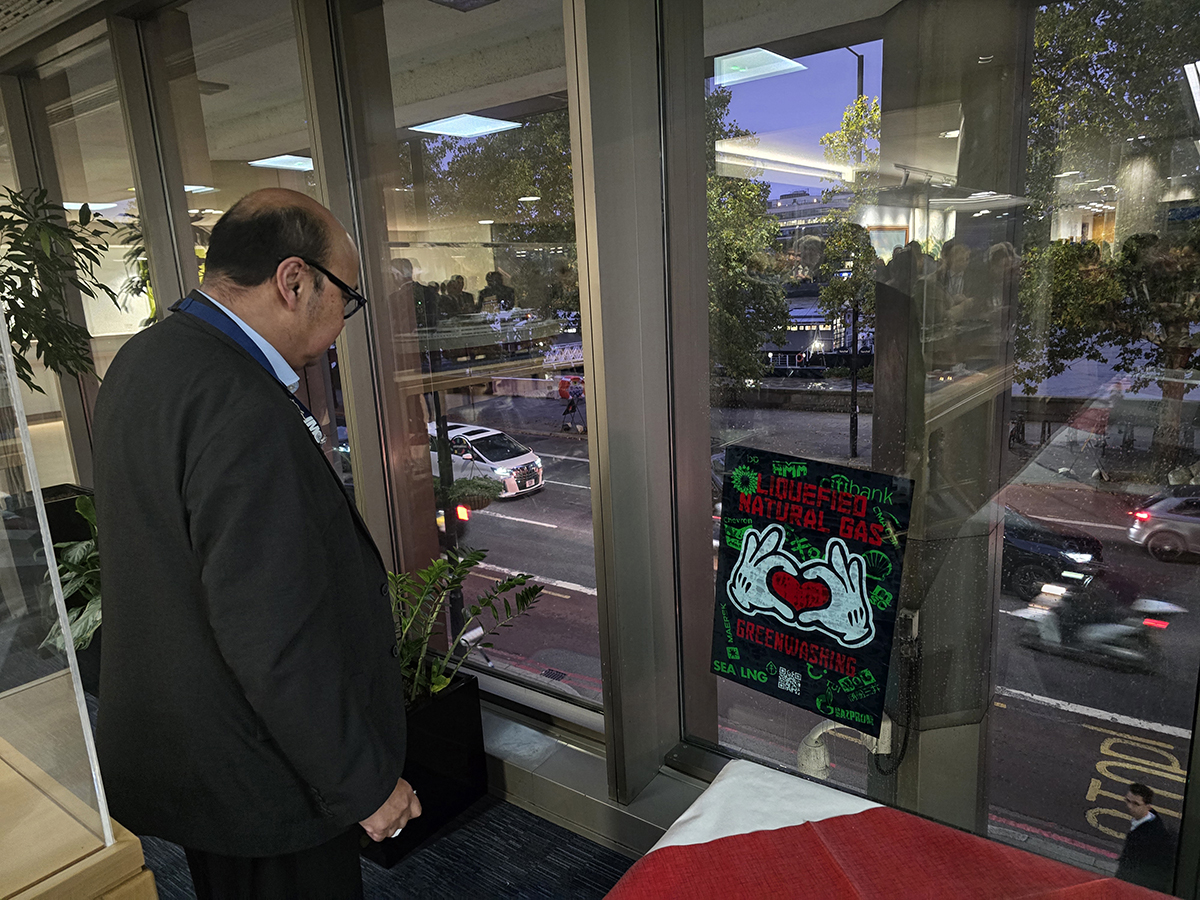
⬆️ Ha llegado el momento de analizar quién ha estado lavando la cara al GNL. No hay que buscar mucho, los miembros de MAR/GNL ofrece una lista completa de sinvergüenzas. El petróleo y el gas no pueden formar parte del "futuro del transporte marítimo". Si la OMI de la ONU se toma en serio la reducción de la contaminación, el transporte marítimo debe dejar de utilizar combustibles fósiles.
-
Scrubby representa el flagrante lavado verde que dará al GNL un pase libre para evitar cualquier plan del MEPC para incluir el GNL en las regulaciones de contaminación del transporte marítimo / gravámenes fiscales - convirtiendo al GNL en el combustible fósil para el transporte marítimo (mientras se siguen acelerando las emisiones peligrosas y los beneficios obscenos para las industrias de los combustibles fósiles y el transporte marítimo). Scrubby, la esponja verde, quería asegurarse de que El futuro del transporte marítimo mensaje en nombre de SEALNG.ORG fue visto por todos los delegados de la OMI y los Estados miembros.
Después de todo, Scrubby no quería que sus empleadores, las industrias de los combustibles fósiles y del transporte marítimo, perdieran la oportunidad de dar una imagen ecológica del GNL antes de las discusiones del MEPC sobre los gravámenes a los combustibles marítimos (que empresas como CMA CGM y Exxon Mobil así como sociedades de clasificación como DNV y ABS que el GNL puede evitar vendiéndose como el combustible "verde" que ciertamente no es).
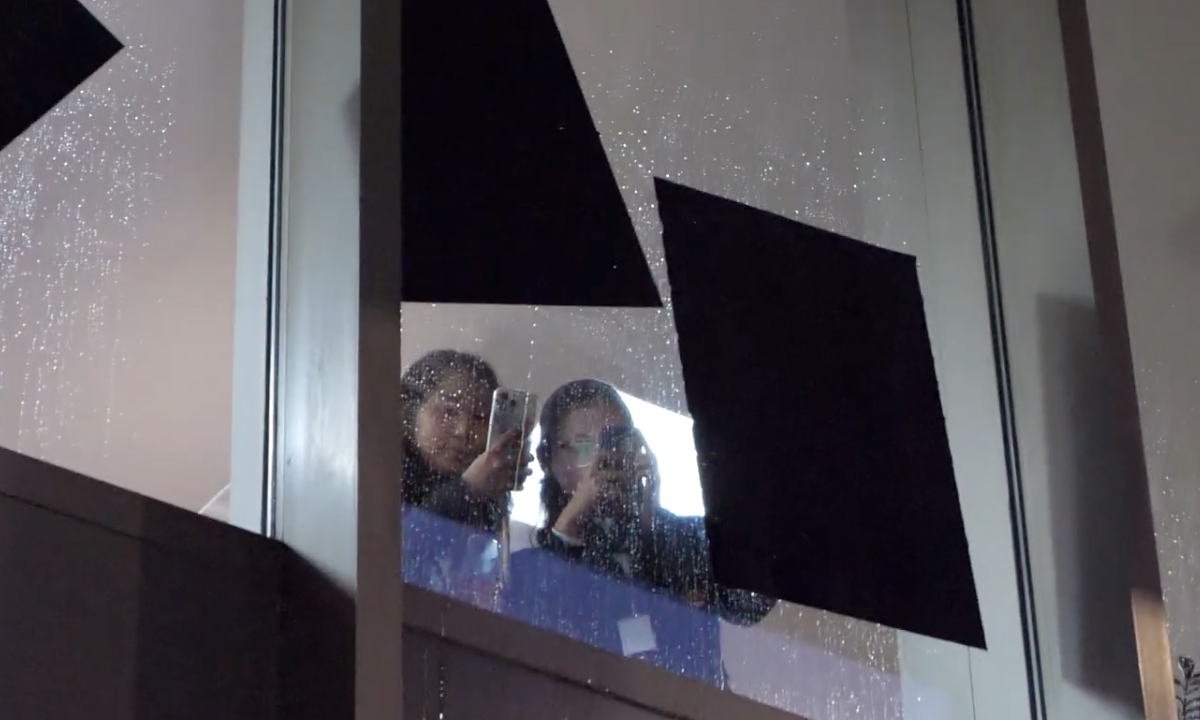
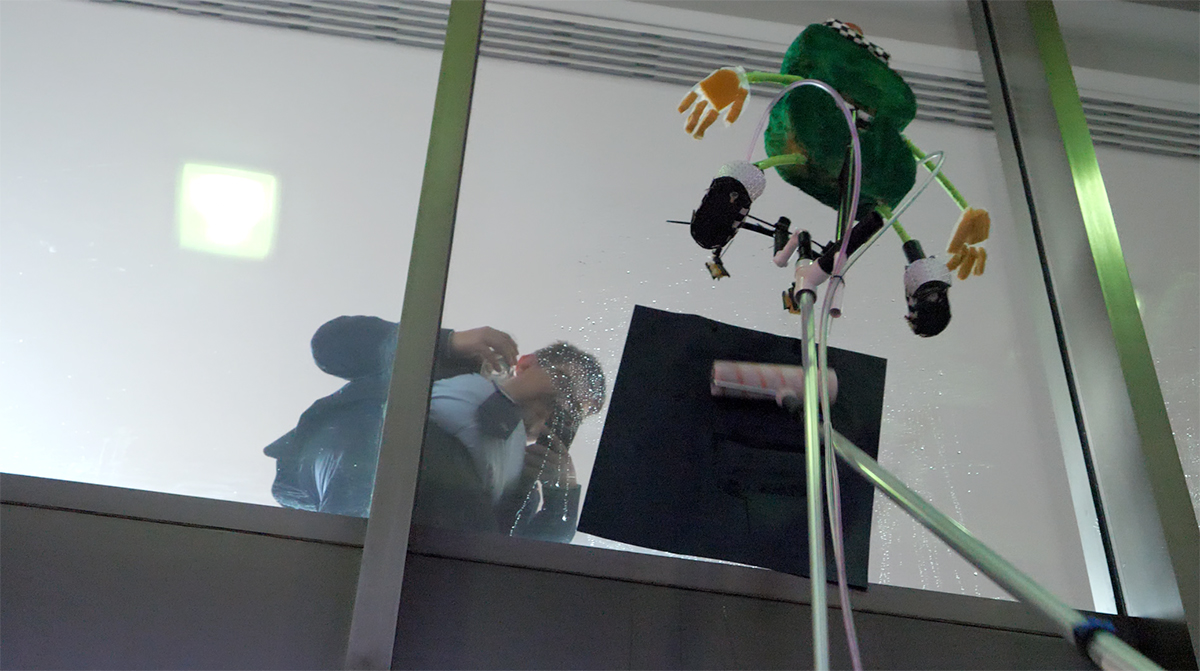
⬆️ Los delegados hacen fotos de los carteles.
-
La representación celebra la marioneta rampante que campa a sus anchas en las reuniones del MEPC. Reuniones dominadas por los intereses de la industria naviera, una industria empeñada en cimentar su romance con la industria del petróleo y el gas adoptando el sucio GNL como su combustible preferido. Y ello a pesar de las recientes investigaciones que han puesto al descubierto las mentiras de plataformas de presión industrial como MAR/GNL. La investigación revisada por expertos revela que el GNL extraído y exportado desde Estados Unidos es 33% más contaminante que el carbón, disputándose el título de combustible fósil más letal. A lo largo del proceso de extracción y suministro de GNL se producen fugas de metano que aumentan los niveles de mortalidad y causan problemas de salud. Y la extracción de GNL destruye tierras y comunidades costeras dondequiera que aparezca una planta de GNL. Estas mismas fugas continúan a bordo Buques propulsados por GNLcontribuyendo a acelerar el colapso climático y el de nuestras economías. Para encubrir esta incómoda verdad, la industria pregona biometano y e-metano productos que sólo representan el 6% del mercado de la UE e incluso menos en todo el mundo (y ambos siguen filtrando metano a lo largo de sus cadenas de suministro y, en el caso del biometano, agotan los recursos de la tierra y disparan la escasez y los precios de los alimentos). La escala industrial del lavado verde del GNL ha convertido al MEPC de la OMI de la ONU en una marioneta de la industria del petróleo y el gas.

⬆️ "¡Esta es tierra privada, por favor váyanse ahora!"
"Lo intentaré señor, pero por favor tenga cuidado con el suelo mojado, es bastante resbaladizo".
"Váyanse, salgan de esta tierra, están cometiendo allanamiento suave".
"Lo haré si quitas la barrera, mi cadera no está muy bien y no puedo superarlo..."
-
Gas natural licuado (GNL) - los hechos
El GNL es un combustible fósil que, cuando se extrae, se transporta y se quema como combustible marino, deja escapar metano a la atmósfera, un gas peligroso para el calentamiento global que está sobre 80 veces más calentamiento del clima a corto plazo (20 años) que el dióxido de carbono.
El Grupo Intergubernamental de Expertos sobre el Cambio Climático (IPCC) de la ONU identificado la rápida reducción de las emisiones de metano como una de las principales prioridades para limitar el calentamiento global a un nivel lo más cercano posible a 1,5°C. El IPCC último informe centrarse en la mitigación del clima deja claro que el gas fósil en forma de GNL no es una solución para la descarbonización del transporte marítimo.
Contrariamente a lo que exige la climatología, las compañías navieras y portuarias han ido a toda máquina a popa, invirtiendo fuertemente en GNL fósil, alegando que el combustible reducirá su impacto medioambiental y la contaminación climática. Actualmente hay más de 785 nuevos cargueros encargados en todo el mundo, de los cuales más de 400 se están construyendo para funcionar con GNL fósil sucio.
Quemar más GNL fósil a bordo de los buques es un desastre en ciernes para nuestro planeta. Solo aumentaría las emisiones de metano de los buques, que ya aumentaron en 180% entre 2016 y 2023, según un reciente Informe del Consejo Internacional de Transporte Limpio (ICCT).
Las emisiones de metano también disminuyen la calidad del aire. Además, el aumento de la demanda de GNL -incluido el sector marítimo- provoca efectos adversos en tierra, como la contaminación del agua potable, la reducción de la producción agrícola y el aumento de las tasas de mortalidad prematura.
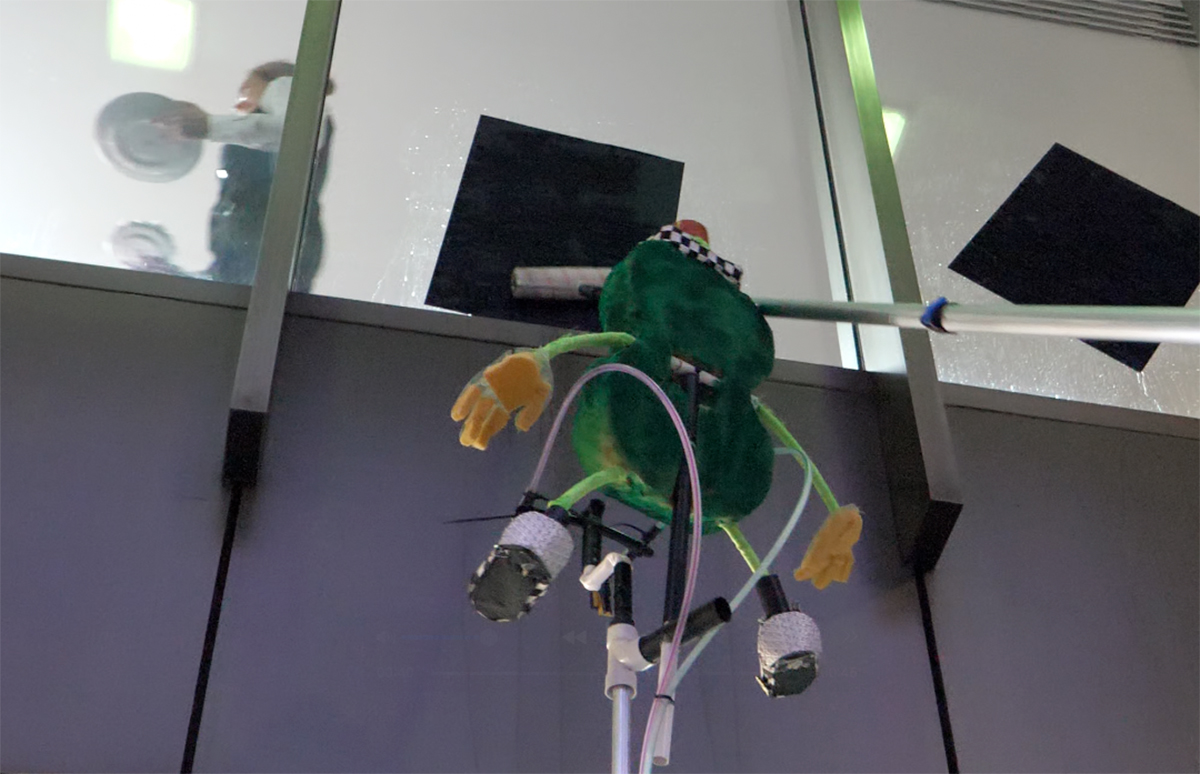
⬆️ Regular la contaminación marítima es un trabajo hambriento, por desgracia los canapés no salieron a la calle.
-
Necesitamos una normativa estricta sobre el metano en la OMI
Según la IPCC (AR6)Para hacer frente a la emergencia climática y a sus devastadores efectos sobre las personas es necesario abordar urgentemente las emisiones de metano a corto plazo. Los defensores del GNL están engañando a los responsables políticos sobre la magnitud real de sus impactos en el clima y la salud, al tiempo que ponen en peligro un futuro de supervivencia en este planeta.
La Organización Marítima Internacional (OMI) es el organismo de las Naciones Unidas que regula el transporte marítimo internacional. En la actualidad, no existe ninguna normativa internacional específica para las emisiones de metano de los buques. Sin embargo, existen varias oportunidades para integrar ampliamente el metano en el marco regulador de la OMI durante el Comité de Protección del Medio Marino (MEPC82). Si esto no ocurre, proponemos un futuro más drástico para la OMI.
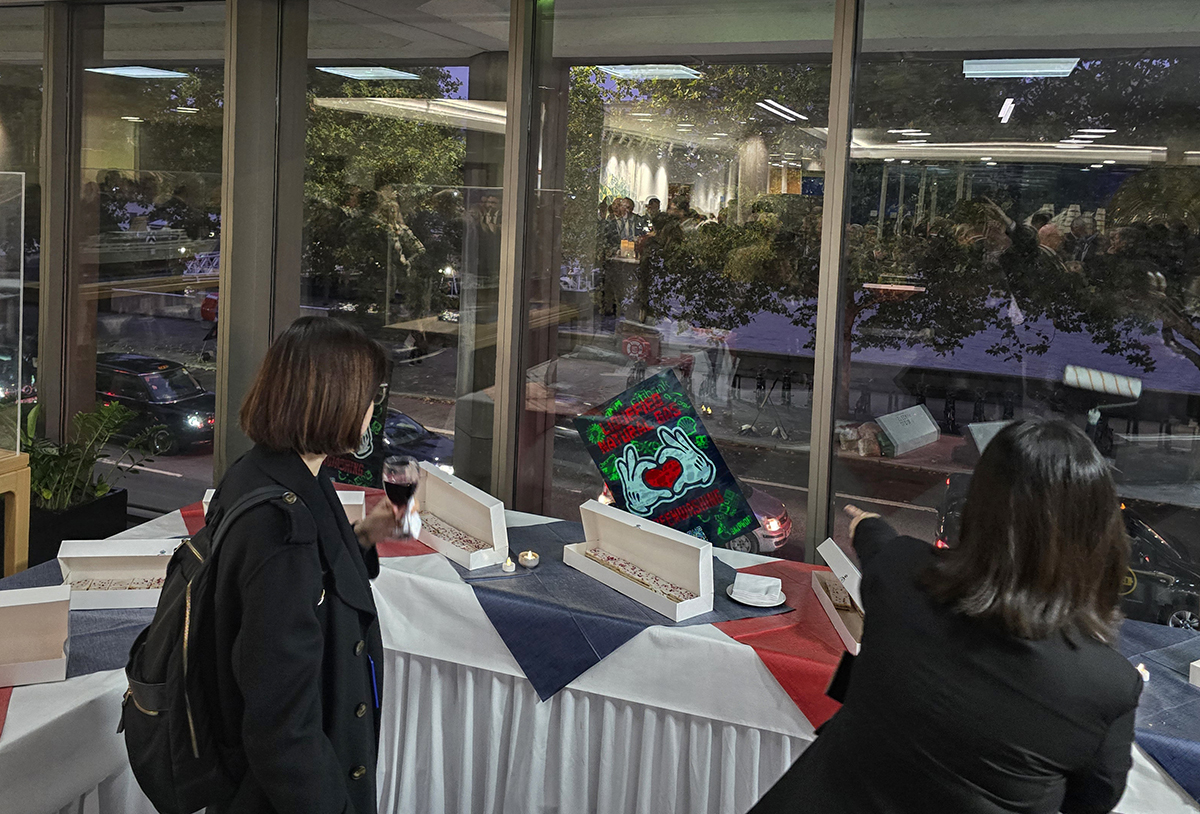
⬆️ "¡Mira ese cartel que la marioneta ha pegado en la ventana!"
"¿Significa que somos cómplices del lavado verde?".
Sí lo es, y también lo es la OMI de la ONU si no regula el metano (el subproducto agujereado del GNL) junto con otros combustibles fósiles.
-
Llamamiento a la acción en la OMI:
El GNL es un combustible fósil que afecta negativamente a las personas, el medio ambiente y el clima en todas las fases de su ciclo de vida.
Exigimos:
1. Las emisiones de metano se consideran un gas de efecto invernadero y se incluyen en cualquier plan del MEPC para gravar el transporte marítimo con un impuesto sobre el carbono, ponderado por el exceso de capacidad de forzamiento climático del metano fugitivo.
2. Los Estados miembros de la OMI reconozcan el GNL como combustible fósil y dejen de dejarse engañar por la GNL MARINO los grupos de presión, excluyéndolos de la OMI.
3. La OMI fomentará la eficiencia y el uso de la navegación lenta, la reducción de la capacidad y embarcaciones de vela y propulsión eléctrica incentivando la incorporación al sector del transporte marítimo, capacitando y mejorando las cualificaciones de los trabajadores e introduciendo rutas marítimas más justas.
Si la OMI no actúa Océano Rebelión demandas:
La ONU debe crear un nuevo organismo transparente y representativo que gobierne el Océano en beneficio de TODA la vida. Este nuevo organismo debe tener como única medida de éxito la restauración y reposición del Océano del que dependen todas nuestras vidas. Debe sustituir el poder corporativo por el poder popular. Y debe representar a las muchas formas de vida marina que hacen del océano su hogar.
-
Fotos de S. Staines.